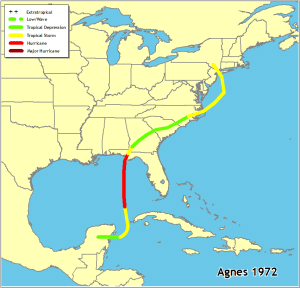
A lot of residents were stranded in their homes, cars, businesses.
Frederick, Md. (KM) – Heavy rains and a lot of flooding were the results when Hurricane Agnes came to Frederick County 50 years ago this month. Jack Markey, Director of Emergency Management for the County, says there were about 1,000 people reported stranded in their homes, their cars and even their businesses due to high water. “The main damage for us was we lost almost 30–either completely destroyed or significantly damaged–bridges, “he said. “Some that were crossing the Monocacy River and some which were just crossing streams.”
But he says there was no loss of life due to Hurricane Agnes.
The hurricane, which was tropical storm when it entered Frederick County in late June, 1972, was one of the costliest storms in the United States, claiming 117 lives, and causing an estimated $3.1-million in damage, according to the Maryland Department of Emergency Management. In Maryland there were 21 lives lost, mostly due to flooding, and $110-million in damage. That’s in 1972 numbers, according to MDEM.
Damage from Hurricane Agnes was particularly high in New York, Pennsylvania and Virginia as well as Maryland.
Markey says residents in Frederick County knew Hurricane Agnes was coming in 1972, but could not know of the impact it would have locally. “I think we knew she was working her way up the coast but really weren’t prepared for that 16 or so inches of rain that were deposited across the county and then to our north,” he said.
Technology has improved over the past 50-years so that there are more sophisticated ways to inform the public about approaching storms or weather incidents. “We are informed by what has happened in the past,” says Markey. “And I think we’ve come a long way in terms of Weather Service awareness, watch and warning, and abilities to get information to people on their Smart Phones and their Smart TV’s.”
But he says emergency officials still need to educate the public on the dangers of hurricanes and other weather incidents, especially reminding motorists not to drive through flooded roadways. “When we had the flash flooding back in May of 2018, we had people still driving through flooded roadways and nearly losing their lives; and putting the lives of our heroic first responders at risk by having them to go into those floodwaters to try to save their lives,” says Markey.
He also urges parents to remind their children not to play in the floodwaters. “Often floodwaters look attractive to play in,” says Markey. He notes the water could be much deeper than it appears.
By Kevin McManus